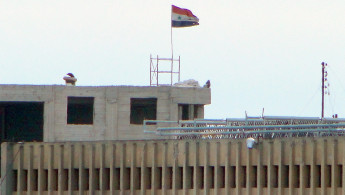Human rights group documents forced disappearance of over 98,000 Syrians
The Syrian Network for Human Rights (SNHR) has released a new report saying that it has documented the forced disappearance of at least 98,279 people in Syria over the course of the eight-year war.
The United Nations defines forced disappearance as the arrest, detention or abduction of persons followed by a refusal to disclose their fate or whereabouts or a refusal to acknowledge the deprivation of liberty, which places these persons outside the protection of the law.
The SNHR also said that an additional 46,000 people had been detained by all parties in the war, but .
SNHR stressed in its report that the Assad regime is “by far the most prolific perpetrator” of forced disappearance, adding that this is a “crime against humanity” according to Article 7 of the Rome Statute of the International Criminal Court.
In early 2018, the Assad regime began to publish notices saying that hundreds of people who it had forcibly disappeared were now deceased, without noting the cause of death. Hundreds of thousands of people who were detained by the regime have been denied visits from their families or attorneys, and this means that they are now considered forcibly disappeared.
It has documented 144,889 cases of people who have been detained or forcibly disappeared since March 2011 with 128,417 of these have been detained or forcibly disappeared by the Assad regime, including 3,507 children.
Rebel groups were accused of disappearing of detaining or disappearing 2,488 people, including 329 children, while Islamist extremist groups including the Islamic State group and Hayat Tahrir al-Sham said to have disappeared 10,721 people, including 349 children.
Fadel Abdul Ghany, the Chairman of the Syrian Network for Human Rights said that forced disappearance was "the most powerful and sadistic weapon of war".
"The record of enforced disappearance compared to the population in Syria is horrific and devastating," he added.
Nuha Noureddin, an activist who has campaigned for the release of prisoners told The New Arab that almost every Syrian knows someone who has been disappeared by the regime.
"There is no Syrian family that hasn't been affected by forced disappearances. Whether it was the hundreds of thousands of people who were taken from their families in the 1980s or the hundreds of thousands taken since 2011. Families have lost their loved ones, many don’t know the fate of those taken and where they are. Many of these people have been killed under torture," she said.
"The families of the disappeared have been fighting non-stop for their loved ones to be free or at least to know their fate. Their efforts have fallen on deaf ears."
The report noted that Syrian regime forces followed a pattern of arresting people, which resembled kidnapping.
Armed men - affiliated with the regime’s security apparatuses - wearing either military or civilian uniforms stormed houses without presenting any arrest warrant, or nabbing individuals on the streets.
Violence would be used at the scene of the arrest, with the arrested individual subjected to beatings and verbal humiliations before being dragged off.
The SNHR said that families of victims of enforced disappearance were in a constant state of anxiety over their loved ones.
One of the cases it documented was that of Abdul Rahman Idris, a 15-year-old Palestinian-Syrian school student from the Yarmouk Camp south of Damascus who was disappeared in the capital on 21 September 2012.
"I left the house in a hurry in search of Abdul Rahman after I called him repeatedly and his cell phone was switched off. I found my son near the bakery," his mother Sanaa, told SNHR.
"The minute I reached him members of the security forces gathered around me and told me that they would only take Abdul Rahman for interrogation and then release him. When I tried to stop them, they beat me and then took him and he never came back."
In February 2013, Sanaa received news that her son had been imprisoned in the State Security Branch prison outside Damascus.
She has not heard anything since, while the regime security agencies have denied Abdul Rahman's existence.
The regime's practice of disappearing individuals is not new. Many people were arrested and believed to have been murdered in detention during the 1980s, following an attempted rebellion against late Syrian President Hafez al-Assad.
Read more: Jordanian tourists are being ‘disappeared’ by Assad’s regime





 Follow the Middle East's top stories in English at The New Arab on Google News
Follow the Middle East's top stories in English at The New Arab on Google News
![MP Essam Diab's pursuit to block TikTok in Egypt has revived an already ongoing debate in the country. [Getty]](/sites/default/files/styles/image_330x185/public/1230748046.jpeg?h=a5f2f23a&itok=-8MqBLLC)

